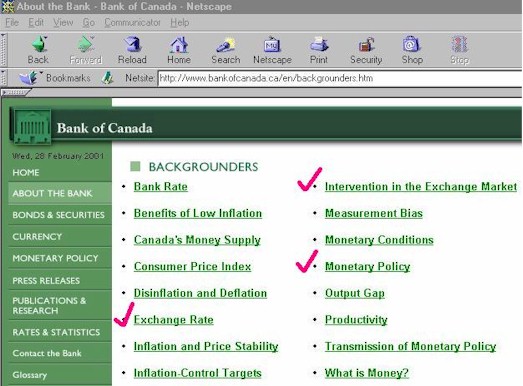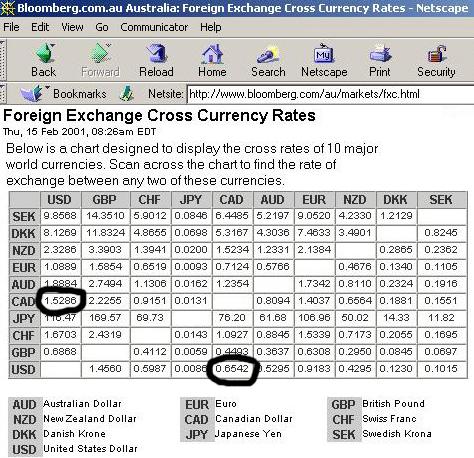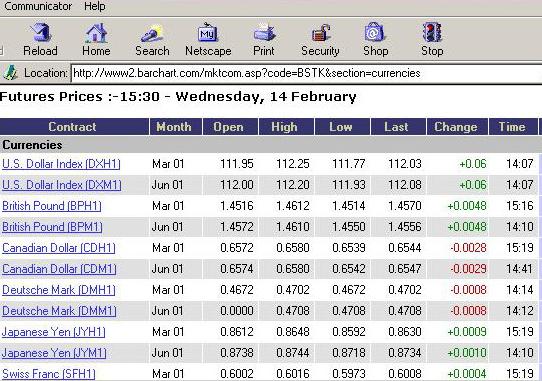Foreign Exchange Topics

| 4X
Foreign Exchange Topics |
 |
| including material
from
Global Business Today, 2nd Canadian Ed + 3rd Ed, 4th Ed., 5th Ed, and 6th Ed. |
 , ,  |
.....
| INTRODUCTION | 4X - Foreign
Exchange is a rather complicated and challenging topic and in some situations,
it can be an entire four month course. It is not our intention to cover
all 4X topics here, but rather introduce the concepts of some key topics,
and also point the way to some resources online where additional information
can be pursued for students with a strong international finance interest.
We will discuss;
|
| Why would you want to get involved in the Foreign Exchange Market? | "If
you are a Canadian business that has suppliers or customers outside of
Canada, then you face foreign exchange risk. If you have accounts
payable in another currency and the Canadian dollar weakens by the time
they come due, it will cost you more to pay those accounts than you had
originally anticipated. If you have accounts receivable in another currency
and the Canadian dollar strengthens by the time you collect them, then
the funds you receive will be worth less than you had planned."
this quote was at www.tdbank.ca/business/foreign/info_foreign.html |
| ? 4X | What
is the Foreign Exchange Market?
- a simple explanation
|

Chpt 9 |
What
are the main functions of the Foreign Exchange Market?
p. 300 Global Business Today, 2nd Ed. |
| Factors
that influence
Exchange Rates |
Factors
that influence Exchange Rates
|
| Factors
that influence
Exchange Rates |
Expanded
...
|
| Factors
that influence
Exchange Rates |
|
| Factors
that influence
Exchange Rates
|
|
| Factors
that influence
Exchange Rates
|
|
| Factors
that influence
Exchange Rates |
|
| Factors
that influence
Exchange Rates |
|

| Factors affecting
the exchange rate
read http://www.bankofcanada.ca/en/backgrounders/bg-e1.htm "Canada has a floating exchange rate. .. The exchange rate is affected by supply and demand for Canadian dollars in international exchange markets. If demand exceeds supply, the value of the dollar will go up. If the supply exceeds demand, its value will go down. On an average day, CAN$37 billion is bought and sold on the international exchange markets. Several factors influence the supply of and demand for Canadian dollars. If interest rates are higher in Canada than in other countries, investors may choose to invest in Canada, increasing demand for the dollar, providing that the expected rate of inflation is not higher in Canada than among our trading partners. If our inflation rate is higher, investors are less likely to prefer Canada — even with higher interest rates — because of the expectation that the value of the dollar will be eroded by inflation. " |
| 4X
info
from the major banks in Canada |
.
RBC also have a short page with examples of situations a company would be in that require using 4X instruments. They call this page grandly "Foreign Exchange Case Studies" it used to be at www.royalbank.com/sme/guides/foreign_exchange/case_studies.html but that link is not working in 2005 RBC also had a helpful page
which has a good lead in to the topic of
"The globalization of business and interdependence of world markets has increased the chances of severe and unpredictable currency fluctuations. These trends open a category of risk for all Canadian businesses that can be new and unfamiliar. What's more, foreign exchange losses come straight out of your profits, often without tax deductibility and the possibility of recovery. When your profit margins are already slim, foreign exchange losses can make or break your business in any given financial period." this
was posted previously at www.royalbank.com/sme/guides/foreign_exchange/risk.html
|
| 4X
info
from the major banks in Canada
|
RBC says "Any
business owner or manager can determine the value of a foreign exchange
strategy in just six steps:
|
| 4X
info
from the major banks in Canada
|
On another page,
RBC has some good points specifically identifying the various categories
of your business operations within which exchange rate risk can occur.
The original list was formerly posted at www.royalbank.com/sme/guides/foreign_exchange/strategy.html
"Your Exposure to Foreign Exchange Risk"
|
| 4X
info
from the major banks in Canada |
nnn
old link www.scotiafx.com/HedgingStrategies.htm |
| Spot
Transactions
|
Spot Transactions
Spot refers to the price
of one currency in terms of another.
old link www.scotiafx.com/HedgingStrategies.htm#spot. |
| Spot
Transactions |
nn
"Advantages
|
| Spot
Transactions
|
Spot Price
- Disadvantages - continued
"Although the spot market lets your company buy or sell currency as you need it, spot exchange rate movements are highly unpredictable, even during a single trading day. Relying on the spot market for future foreign exchange is highly speculative. It can expose your company's cash flow to the risk of unfavourable changes in foreign currency values." was posted at www.tdbank.ca/business/foreign/management/spot.html (link dead)
|
| Forward Contracts | Forward
Contracts
So if you are nervous about the Spot Market and want to lock in a currency, you can execute a forward contract. One states the amount of a currency to be exchanged on a specific day - you may employ individually tailored contracts Long (Short): Bought
(Sold) a futures contract to receive (deliver) foreign exchange.
A Long is similar to a forward contract to buy foreign exchange while
a Short is similar to a forward contract to sell foreign exchange.
"Advantages
|
| Forward
Contracts
|
Forward Contracts
TD banks's web site says
similarly
"A Forward Contract lets
your company buy or sell one currency against another, for settlement on
the day the contract expires. Unlike spot contracts, a forward contract
eliminates the risk of fluctuating exchange rates by locking in a price
today for a transaction that will take place in the future. This is called
hedging (or insuring) your expected foreign currency transactions. By protecting
your future cash flow against negative currency
Forward Contract does not reflect market predictions of future spot exchange rates. Rather, it reflects the difference in interest rates between countries. |
| Bid
/ Ask
Spread |
The Bid /
Ask Spread represents the bank's fee for service in effecting the currency
exchange between two parties.
If the currency is popular, and a lot of volume on both "sell" and "buy" side is required, the spread will be small because the bank does not have to worry about the risk of buying a currency because it can soon sell it. If the currency is not popular, or the volume on both "sell" and "buy" side is low, the bank will charge more for the transaction because it wants to cover any risk in holding the currency to long The Bid / Ask Spread can be calculated = (ask price minus bid price)/ ask price |
| Cross
Rates
|
Direct
Quotes (American Terms)
|
| Cross
Rates
|
Indirect
Quotes (European Terms)
1 $ CDN = .75 USD |
| Cross Rates | Cross Rates
- an example - the table laid out below allows you to see the direct quote (American style) and the Indirect quote (European style) - most Ontario people who cross the border for shopping in Buffalo prefer the indirect quote - it is easier for shoppers to calculate how much consumer products cost - business people use both direct and indirect quotes, it depends on what role is played by the US dollar in their plans. If the company sells most of its product to the US it might have the company business demoninated in US dollars (like Northern Telecom) |
| Cross Rates | Cross Rates
 |
 |
Arbitrage
"The purchase of securities in one market for immediate resale in another to profit from price discrepancy" |
| Arbitrage | Capitalizing
on a discrepancy in quoted prices - it is a complicated topic and something
that is discussed in some MBA courses. The reason for the discrepancy
in prices is sometimes a simple matter of geography, someone in one
part of the world wants to sell a ton of copper at $60 a pound and someone
in another part of the world wants to buy it at $62 a pound.
A simple explanation would be that Arbitrage is taking advantage of the fact that one thing has two different prices - you can then buy it at the low price, and sell it for a profit to the person who is paying the higher price. This usually only works for very large quantities and is usually applied to terms of millions or tens of millions of dollars. It is the type of business in which you have to make decisions very quickly and employ all the advantages of the "Technological Environment". The noun for people who do this ia "arbitrageur" - an individual or bank that monitors the commodity markets and makes the play. WTGR |
| Role
of the Banks |
Role of the
Banks
|
| Currency
Swaps |
"Swaps are quoted similar to outright forwards as BID / OFFER spread on swap points. However, it is the Far Date that is priced (T2)" Example: A holder of US Dollars agrees to "sell and buy" US Dollars against CAD from Scotia. This means a sale of USD at T1 and is accompanied by a purchase of USD at T2 for a predetermined price. Settlement:
Implied View:
|
| Currency
Futures
|
Currency
Futures
similar to Forward Contracts,
BUT, they are NOT negotiated like Forward Contracts
|
| Currency
Futures
|
You can see an
example of Currency Futures online from barchart.com
see also 
Barchart.com was launched in December 1995 as an Internet web site designed for commodity and index traders. |
| Currency Futures | Currency Futures
Prof. Richardson has created
a Powerpoint specifically on Currency Futures and Options
www.witiger.com/powerpoints/intl~banking/INTL303chpt5currencyfutures.ppt essentially
currency futures and options contracts are used
Futures
contracts
|
| Hedging
|
Hedging
In "real life", hedging is like a contingency plan I want
to get a ride to the airport for a business trip, I’ll book an airline
limo
www.witiger.com/powerpoints/intl~banking/INTL303chpt5currencyfutures.ppt |
| Hedging
|
Hedging exchange
rate exposure
www.witiger.com/powerpoints/intl~banking/INTL303chpt5currencyfutures.ppt |
| Options
|
Foreign CurrencyOptions
"A Foreign Currency Option
is like an insurance policy. It is a "hedging tool" that lets you exchange
one currency for another on a given date, at a prearranged exchange rate
(strike price), without obliging you to do so. Like forward contracts,
foreign currency options eliminate the spot market risk for future transactions.
Unlike forward contracts, they do not oblige you to deal if the spot
rate is more favourable than your option's strike price. As the
name implies, you have the option to deal or not."
|
| Options
|
Currency Put
Options
from www.witiger.com/powerpoints/intl~banking/INTL303chpt5currencyfutures.ppt Contract grants the right to sell a specific currency
put options purchased when exchange rate expected to fall |
On this page are several links and quotes and screen captures from the major Canadian banks and other financial institutions
Carrie Denton, Managing Director,
ScotiaFX/E-Commerce, Scotia Capital, Bank of Nova Scotia
Ms. Denton was particularly
helpful and the co-operation and assistance from her department at Scotia
Capital are much appreciated.
copies of emails are kept
in the permissions binder
Contact has been made by
email with
Royal Bank
- Beja Rodeck, Sr. Mgr, Media and Public Relations
TD Bank
- Neil Parmenter and Jeff Keay, Senior Managers, External Communications
Scotiabank
- Carrie Denton, Managing Director, ScotiaFX/E-commerce
for permission to quote
from their site, and use screen captures
copies of emails are kept
in the permissions binder
As for the Bloomberg site,
they state
"...you may include a link(s)
on your Web site to the Bloomberg.com's publicly accessible Web page"
Prof.
W. Tim G. Richardson ©www.witiger.com![]()